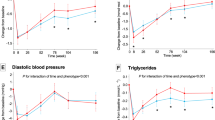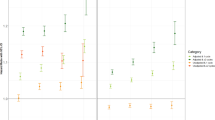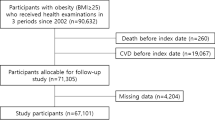Abstract
The aim of this study was to examine the relationships of short-term weight gain, weight loss, and weight cycling on the odds of developing hypertension. Normotensive middle-aged German men and women (n=12 362) of the European Prospective Investigation into Cancer and Nutrition-Potsdam Study were assigned to categories of 2-year short-term weight changes that were self-reported to have occurred prior to recruitment into the study (gain only, loss only, weight cycling, stable). After 2 years of follow-up after recruitment, 180 cases of incident essential hypertension were identified. In logistic regression models, odds ratios were estimated for the associations between short-term weight changes and risk of developing hypertension. Obesity status (BMI⩾30 or BMI<30 kg/m2) modified the associations between short-term weight change and incidence of diagnosed hypertension. Among obese individuals, short-term weight gain occurring during the 2 years prior to recruitment (OR=2.79, 95% CI 1.19–6.56), weight loss (OR=6.74, 95% CI 2.58–17.6) and weight cycling (OR=4.29, 95% CI 1.55–11.9) were strongly positively associated with incident hypertension, adjusted for age and gender, compared to obese individuals with short-term stable weight. No significant associations between short-term weight changes and risk of diagnosed hypertension were detected among non-obese individuals. Short-term weight changes appeared to present strong risk factors for developing hypertension among obese individuals. The effect seen for weight cycling supports the hypothesis that weight cycling increases the risk of hypertension. The finding for short-term weight loss may be explained by subsequent weight regain and needs further investigation.
This is a preview of subscription content, access via your institution
Access options
Subscribe to this journal
Receive 12 digital issues and online access to articles
$119.00 per year
only $9.92 per issue
Buy this article
- Purchase on Springer Link
- Instant access to full article PDF
Prices may be subject to local taxes which are calculated during checkout

Similar content being viewed by others
References
Perreault S et al. Impact of treating hyperlipidemia or hypertension to reduce the risk of death from coronary artery disease. CMAJ 1999; 160: 1449–1455.
Thakur V, Richards R, Reisin E . Obesity, hypertension, and the heart. Am J Med Sci 2001; 321: 242–248.
Thamm M . Blood pressure in Germany—current status and trends (article in German). Gesundheitswesen 1999; 61: S90–S93.
Huang Z, Reddy A . Weight change, ideal weight and hypertension. Curr Opin Nephrol Hypertens 1999; 8: 343–346.
Huang Z et al. Body weight, weight change, and risk for hypertension in women. Ann Intern Med 1998; 128: 81–88.
Bakx JC et al. Development of blood pressure and the incidence of hypertension in men and women over an 18-year period: results of the Nijmegen Cohort Study. J Clin Epidemiol 1999; 52: 531–538.
Juhaeri et al. Associations between weight gain and incident hypertension in a bi-ethnic cohort: the Atherosclerosis Risk in Communities Study. Int J Obes Relat Metab Disord 2002; 26: 58–64.
Leitschuh M et al. High-normal blood pressure progression to hypertension in the Framingham Heart Study. Hypertension 1991; 17: 22–27.
Stamler R, Stamler J, Gosch FC, McDonald AM . Primary prevention of hypertension—a randomized controlled trial. Ann Clin Res 1984; 16: S136–S142.
Stevens VJ et al. Weight loss intervention in phase 1 of the Trials of Hypertension Prevention. The TOHP Collaborative Research Group. Arch Intern Med 1993; 153: 849–858.
Stevens VJ et al. Long-term weight loss and changes in blood pressure: results of the Trials of Hypertension Prevention, phase II. Ann Intern Med 2001; 134: 1–11.
Curtis AB, Strogatz DS, James SA, Raghunathan TE . The contribution of baseline weight and weight gain to blood pressure change in African Americans: the Pitt County Study. Ann Epidemiol 1998; 8: 497–503.
Field AE et al. Weight cycling, weight gain, and risk of hypertension in women. Am J Epidemiol 1999; 150: 573–579.
Miller GJ, Maude GH, Beckles GL . Incidence of hypertension and non-insulin dependent diabetes mellitus and associated risk factors in a rapidly developing Caribbean community: the St James survey, Trinidad. J Epidemiol Community Health 1996; 50: 497–504.
Guagnano MT et al. Risk factors for hypertension in obese women. The role of weight cycling. Eur J Clin Nutr 2000; 54: 356–360.
Itoh T, Horie S, Takahashi K, Okubo T . An evaluation of various indices of body weight change and their relationship with coronary risk factors. Int J Obes Relat Metab Disord 1996; 20: 1089–1096.
Boeing H, Korfmann A, Bergmann MM . Recruitment procedures of EPIC—Germany. European Investigation into Cancer and Nutrition. Ann Nutr Metab 1999; 43: 205–215.
Kroke A et al. Blood pressure measurement in epidemiological studies: a comparative analysis of two methods. Data from the EPIC-Potsdam Study. European Prospective Investigation into Cancer and Nutrition. J Hypertens 1998; 16: 739–746.
The sixth report of the Joint National Committee on prevention, detection, evaluation, and treatment of high blood pressure. Arch Intern Med 1997; 157: 2413–2446.
Bergmann MM, Bussas U, Boeing H . Follow-up procedures in EPIC-Germany—data quality aspects. European Prospective Investigation into Cancer and Nutrition. Ann Nutr Metab 1999; 43: 225–234.
Report of a WHO consultation. Obesity: Preventing and Managing the Global Epidemic, Report No. 894. Geneva, 2000.
Hosmer DW, Lemeshow S . Applied Logistic Regression. John Wiley&Sons: Australia, 1989, pp 68–71.
Effects of weight loss and sodium reduction intervention on blood pressure and hypertension incidence in overweight people with high-normal blood pressure. The Trials of Hypertension Prevention, phase II. The Trials of Hypertension Prevention Collaborative Research Group. Arch Intern Med 1997; 157: 657–667.
Holmberg L, Baum M, Adami HO . On the scientific inference from clinical trials. J Eval Clin Pract 1999; 5: 157–162.
Pihl E, Jurimae T . Relationships between body weight change and cardiovascular disease risk factors in male former athletes. Int J Obes Relat Metab Disord 2001; 25: 1057–1062.
Kroke A et al. Recent weight changes and weight cycling as predictors of subsequent two year weight change in a middle-aged cohort. Int J Obes Relat Metab Disord 2002; 26: 403–409.
Ernsberger P, Koletsky RJ, Baskin JS, Collins LA . Consequences of weight cycling in obese spontaneously hypertensive rats. Am J Physiol 1996; 270: R864–R872.
Contreras RJ et al. Dietary obesity and weight cycling in rats: a model of stress-induced hypertension? Am J Physiol 1991; 261: R848–R857.
McGuire MT, Wing RR, Klem ML, Hill JO . The behavioral characteristics of individuals who lose weight unintentionally. Obes Res 1999; 7: 485–490.
French SA, Folsom AR, Jeffery RW, Williamson DF . Prospective study of intentionality of weight loss and mortality in older women: the Iowa Women's Health Study. Am J Epidemiol 1999; 149: 504–514.
Perry GS et al. The validity of self-reports of past body weights by U.S. adults. Epidemiology 1995; 6: 61–66.
Keil U et al. Epidemiology of hypertension (article in German). Münchener Medizinische Wochenschrift 1986; 128: 424–429.
Greenland S . Basic methods for sensitivity analysis and external adjustment. In: Rothman KJ, Greenland S (eds). Modern Epidemiology. Lippincott-Raven: Philadelphia, 1998.
Acknowledgements
Sources of support for research: Deutsche Krebshilfe (grant 70-2488), European Community (grant SPC.2002332).
Author information
Authors and Affiliations
Corresponding author
Rights and permissions
About this article
Cite this article
Schulz, M., Liese, A., Boeing, H. et al. Associations of short-term weight changes and weight cycling with incidence of essential hypertension in the EPIC-Potsdam Study. J Hum Hypertens 19, 61–67 (2005). https://doi.org/10.1038/sj.jhh.1001776
Received:
Accepted:
Published:
Issue Date:
DOI: https://doi.org/10.1038/sj.jhh.1001776
Keywords
This article is cited by
-
The association between diabetes and hypertension with the number and extent of weight cycles determined from 6 million participants
Scientific Reports (2022)
-
Impact of body mass index and body weight variabilities on mortality: a nationwide cohort study
International Journal of Obesity (2019)
-
Changes in body weight and obesity status in German adults: results of seven population-based prospective studies
European Journal of Clinical Nutrition (2016)
-
Atherosclerosis and cardiac function assessment in low-density lipoprotein receptor-deficient mice undergoing body weight cycling
Nutrition & Diabetes (2013)
-
Obesity and Black Women: Special Considerations Related to Genesis and Therapeutic Approaches
Current Cardiovascular Risk Reports (2013)



